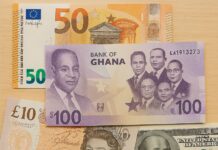
The Ghanaian cedi has shown signs of resilience. After reaching lows of around GHS 16.40 per USD earlier in the year, it appreciated to approximately GHS 10.36 in mid-May before stabilizing near GHS 10.60. – Ghanaian cedi symbols ₵.
This rebound is attributed to proactive government measures, including gold-backed reserves and increased investor confidence.
Future Projections: 3 Months, 6 Months, and 1 Year:
According to DebrichGroup.com, the cedi is expected to maintain its current strength, with projections suggesting it could reach GHS 10.00 per USD if supportive policies continue.
Ghanaian CEDI [currency sign: GH₵ and currency code: GHS] is the unit of currency of Ghana.
The Ghanaian Cedi (GHS), the official currency of Ghana, has been at the center of national and international economic discussions in 2025.
Amid global economic shifts, fluctuations in the US dollar, and domestic financial reforms, the performance of the cedi has become a crucial topic for Ghanaians at home and abroad.
This article explores:
The current exchange rate
The cedi’s recent trends and future outlook
The implications of a falling dollar
What Ghanaians can do to support the cedi
Forecasts for the next year
Current Exchange Rate (As of May 29, 2025)
$1 USD ≈ 15.86 GHS
$100 USD ≈ 1,586 GHS
These rates reflect real-time market conditions and may vary slightly between banks and forex bureaus.
How Long Will the Cedi Stay Strong?
The cedi’s resilience depends on several factors:
Foreign exchange reserves (including gold)
Export performance (especially cocoa, gold, and oil)
Inflation control
Government spending discipline
External economic factors like global oil prices and dollar strength
If these elements are managed well, the cedi could retain relative strength for the next 3 to 6 months, with challenges possibly intensifying in the 9- to 12-month horizon.
How a Falling Dollar Could Benefit Ghana
A depreciation in the US dollar can positively affect Ghana in the following ways:
Positive Impacts:
Lower External Debt Burden: Ghana’s debt, much of it dollar-denominated, becomes cheaper to repay.
Cheaper Imports: Imported goods from non-dollar economies (e.g., China, Europe) may become more affordable.
Stronger Export Earnings: Exports priced in dollars bring more value when converted to cedis.
Investment Appeal: Stability in the cedi attracts foreign direct investment (FDI).
However, caution is needed, as other currencies could gain relative strength, which may increase the cost of imports from non-dollar sources.
What Should Ghanaians Expect?
1. In 3 Months (August 2025):
From DebrichGroup.com analyst, Cedi might stabilize between GHS 10.50–12.00 per USD if current policies hold.
Domestic inflation could ease.
Slight relief on fuel and food prices.
2. In 6 Months (November 2025):
Forecasts suggest the cedi may face renewed pressure, reaching around GHS 12.80–14.00.
Seasonal cocoa exports may cushion this.
3. In 9 Months (February 2026):
Post-holiday imports and possible IMF loan repayments may challenge the cedi.
Rate could hover near GHS 15.00+.
4. In 1 Year (May 2026):
If government spending increases ahead of elections, the cedi could weaken further to around GHS 17–20 per USD.
If fiscal discipline is maintained, the rate could remain under GHS 15.
What Caused the Dollar to Fall?
Several global and domestic dynamics have influenced the relative weakness of the dollar:
High U.S. interest rates tapering off
Reduced global demand for U.S. Treasury bonds
Increased global interest in alternative reserves (gold, yuan, digital currencies)
Emerging markets shifting from dollar-based trade
In Ghana’s case, increased gold-backed reserves and bilateral trade agreements (e.g., oil-for-gold) have reduced dollar demand.
How Ghanaians Can Help Strengthen the Cedi
Buy Local, Export More:
Supporting local industries reduces import dependency.
Expanding export-driven businesses earns foreign exchange.
Invest in Agriculture and Manufacturing:
These sectors reduce food import bills and increase self-sufficiency.
Use Mobile and Digital Payments:
Reduces forex pressure through transparency and formalization of transactions.
Diaspora Investment:
Ghanaians abroad should consider investing in productive sectors, not just real estate.
Invest through local banks to increase foreign currency reserves.
Avoid Panic Buying or Dollar Hoarding:
Speculation drives unnecessary demand for foreign currency.
The Ghanaian cedi has shown resilience in 2025, but its future depends on careful economic management, a supportive global environment, and collective action from citizens. While a weaker dollar offers temporary breathing room, long-term stability will come only from strengthening Ghana’s internal economic capacity.
Ghanaians—both local and in the diaspora—must play their part by investing wisely, consuming locally, and keeping confidence in the national currency.











































